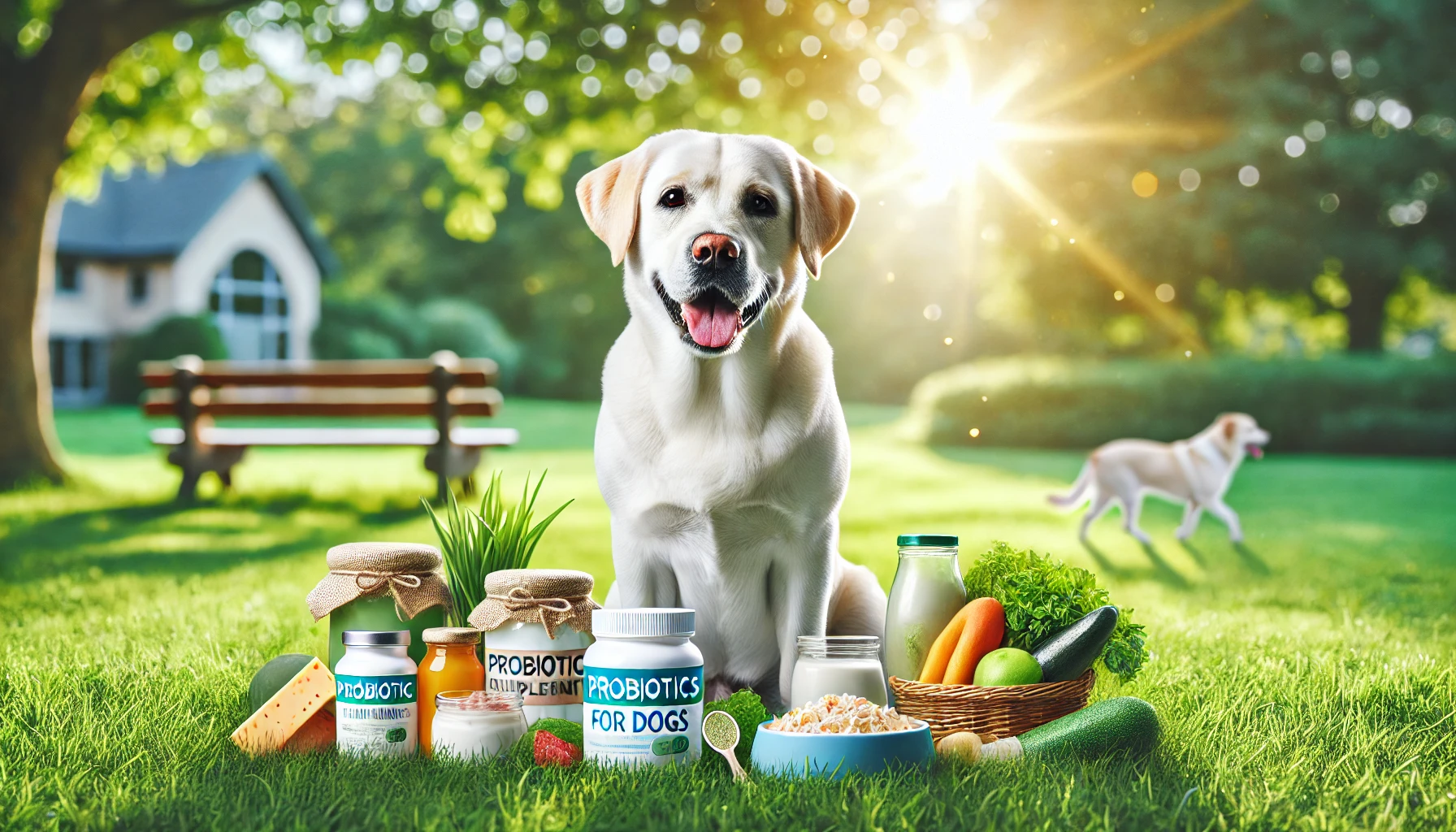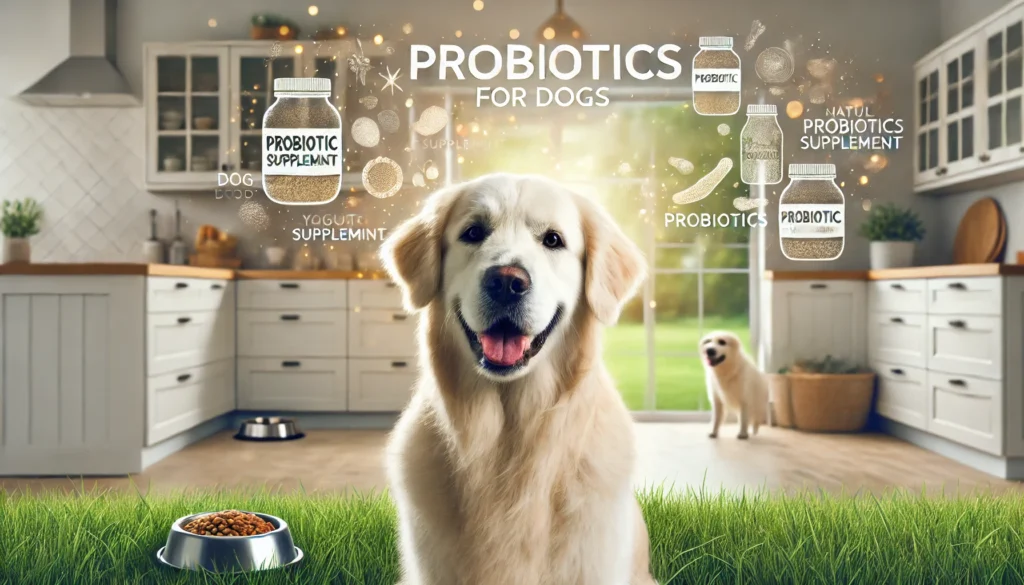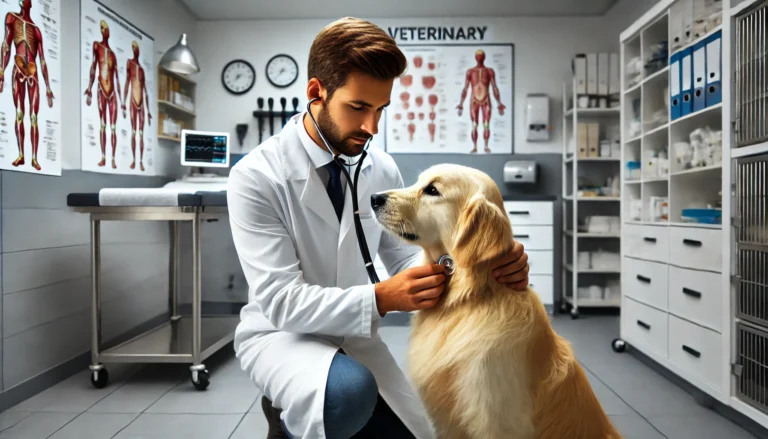Probiotics for Dogs: Do They Work?

Do They Work? YES!Probiotics have work and emerged as a popular supplement in canine health, but many dog owners still question whether they truly work and how they benefit their pets. This comprehensive guide explores probiotics for dogs in detail, breaking down their functionality, benefits, types, and best practices for use. This professional yet easy-to-understand article will provide a complete understanding of probiotics, enabling pet owners to make informed decisions regarding their dog’s gut health and overall well-being.
Understanding Probiotics for Dogs
What Are Probiotics?
Probiotics for Dogs are beneficial microorganisms, primarily bacteria and yeast, that play a crucial role in maintaining gut health. Just like humans, dogs have a complex gut microbiome—a diverse collection of bacteria, fungi, and other microorganisms that aid in digestion, immunity, and overall well-being.
How Do Probiotics Work?
Probiotics for Dogs work by increasing the population of “good bacteria” in the digestive system. The gut contains both beneficial (good) and pathogenic (bad) bacteria. In a healthy dog, these two types coexist in harmony, promoting digestion and immune support. However, disruptions can cause an overgrowth of harmful bacteria, leading to gastrointestinal issues, inflammation, and decreased immunity.
Probiotics support gut health by:
- Replenishing good bacteria.
- Suppressing the growth of harmful bacteria.
- Enhancing nutrient absorption and digestion.
- Strengthening the gut lining and immune system.
How Gut Health Impacts Overall Canine Health
The Role of the Gut Microbiome
A dog’s gut does more than just digest food; it plays a central role in their overall health. Around 70–80% of the immune system resides in the gastrointestinal tract. A healthy gut microbiome influences:
- Digestion of nutrients like proteins, fats, and vitamins.
- Immune response and protection from infections.
- Mood regulation and behavior through the gut-brain axis.
- Skin and coat health.
- Energy levels and vitality.
Common Signs of Poor Gut Health in Dogs
To determine if your dog might benefit from probiotics, watch for these signs:
- Digestive Issues
- Chronic diarrhea or loose stools.
- Constipation.
- Excessive gas or bloating.
- Immune System Weakness
- Frequent infections.
- Low energy levels.
- Skin and Coat Problems
- Itchy, flaky skin.
- Allergies or hot spots.
- Behavioral Changes
- Anxiety or mood swings, which can be linked to poor gut health.
- After Antibiotics
Antibiotics eliminate both harmful and beneficial bacteria, causing a microbiome imbalance. Probiotics help replenish healthy bacteria.
Benefits of Probiotics for Dogs
Improved Digestive Health
Probiotics enhance digestion by breaking down food and supporting nutrient absorption. They help alleviate common gastrointestinal issues like:
- Diarrhea (chronic or acute).
- Constipation.
- Gas and bloating.
- Irritable Bowel Syndrome (IBS).

Strengthened Immune System
Probiotics bolster the immune system by fostering a balanced gut microbiome. A strong immune system helps dogs:
- Fight infections more effectively.
- Recover faster from illness or surgery.
- Reduce inflammation caused by chronic diseases.
Reduced Allergic Reactions
A healthy gut can reduce the severity of allergic reactions. Probiotics work by modulating the immune response, which minimizes itching, hot spots, and skin inflammation caused by environmental or food allergies.
Stress Management
Stress from traveling, vet visits, or changes in routine can trigger diarrhea and other gut issues in dogs. Probiotics help stabilize the gut, reducing stress-related symptoms.
Enhanced Skin and Coat Health
By reducing inflammation and improving nutrient absorption, probiotics contribute to healthier skin and shinier coats. Dogs with recurring skin problems often see significant improvement with consistent probiotic use.
Support for Puppies and Senior Dogs
- Puppies: Probiotics support developing immune systems and reduce the risk of infections.
- Senior Dogs: Older dogs often face digestive issues and weakened immunity. Probiotics help maintain overall health in aging dogs.
Types of Probiotics for Dogs
Lactobacillus
Lactobacillus is a widely studied group of bacteria known for its digestive and immune-boosting properties. It produces lactic acid, which inhibits harmful bacteria.
Common strains:
- Lactobacillus acidophilus: Supports digestion and reduces diarrhea.
- Lactobacillus casei: Helps improve bowel movements.
Bifidobacterium
Bifidobacterium strains promote gut health by improving digestion and enhancing immunity.
Common strains:
- Bifidobacterium bifidum: Helps with nutrient absorption.
- Bifidobacterium animalis: Treats diarrhea and regulates bowel movements.
Saccharomyces boulardii
This yeast-based probiotic is effective for managing diarrhea, especially in dogs on antibiotics. It is resistant to antibiotics, making it a reliable option during treatment.
Enterococcus
Enterococcus faecium supports digestion and reduces symptoms of gastrointestinal disorders like diarrhea.
Multi-Strain Probiotics
Probiotics containing multiple strains of bacteria offer comprehensive benefits, as different strains target different areas of the digestive and immune systems.
do you know
Cetirizine, commonly recognized under the brand name Zyrtec, is extensively used as an effective allergy medicine for dogs. This medication helps alleviate symptoms associated with various allergic reactions in dogs, such as itching, redness, and excessive shedding. As an essential treatment option in veterinary medicine, it offers a safe and effective way to manage allergies without the heavy sedative effects often seen with other antihistamines.
How to Choose the Right Probiotic for Your Dog
Key Factors to Consider
When selecting a probiotic, consider the following:
- Strain Diversity: Opt for supplements containing multiple strains like Lactobacillus, Bifidobacterium, and Saccharomyces boulardii for comprehensive benefits.
- CFU Count: Choose products with 1–10 billion CFUs per serving for effectiveness.
- Quality and Safety: Ensure the probiotic is formulated for dogs, with veterinary approval and third-party testing.
- Storage: Some probiotics require refrigeration, while others are shelf-stable.
- Ingredients: Avoid products with unnecessary fillers, preservatives, or artificial additives.
Administering Probiotics for Dogs
Forms of Probiotics
Probiotics are available in various forms, including:
- Powders: Easy to mix into food.
- Capsules: Can be administered directly or opened and sprinkled on food.
- Chews and Treats: Tasty options that dogs readily accept.
Best Practices for Dosage
Follow the manufacturer’s instructions or your veterinarian’s guidance. Start with small doses and gradually increase to the recommended level as your dog adjusts.
Probiotics Safe for Dogs:
Probiotics are generally safe for dogs when used appropriately. Some dogs may experience mild side effects, such as:
- Gas or bloating.
- Loose stools during the adjustment phase.
If side effects persist, consult your veterinarian.
Conclusion
Probiotics play an essential role in maintaining your dog’s digestive health, strengthening immunity, and enhancing overall well-being. By understanding their benefits, types, and proper administration, you can make informed decisions for your furry companion’s health. Always consult your veterinarian to ensure you select the best probiotic supplement tailored to your dog’s unique needs.
Do probiotics really help dogs?
Yes, Probiotics for Dogs can significantly help dogs by promoting a balanced gut microbiome. They increase the number of “good bacteria” in the digestive system, aiding in nutrient absorption, improving digestion, and enhancing immunity. Probiotics are particularly effective for dogs with gastrointestinal issues like diarrhea, constipation, or gas, as well as those recovering from antibiotics, which often disrupt gut bacteria. Additionally, probiotics help manage allergies, reduce inflammation, and support skin and coat health. While results may vary depending on the dog’s condition, many pet owners report noticeable improvements in their dog’s digestion, energy levels, and overall well-being with regular probiotic use.
How long does it take for dog probiotics to work?
The time frame for Probiotics for Dogs to work in dogs depends on the condition being treated. For mild digestive issues such as diarrhea, you may notice improvements within 3–7 days of starting probiotics. For chronic or more severe conditions, such as long-term digestive problems or allergies, consistent probiotic use for several weeks may be required before significant results are visible. It’s important to follow the recommended dosage and ensure the product is of high quality. If there are no improvements after a few weeks, consult a veterinarian to reassess your dog’s condition and treatment plan.
How do you know if a dog needs probiotics?
A dog may need probiotics if they exhibit signs of poor gut health or digestive issues. Common indicators include chronic diarrhea, loose stools, constipation, excessive gas, and bloating. Additionally, frequent infections, weakened immunity, or recurring skin problems like itching and allergies can signal an imbalanced gut microbiome. Stressful events such as changes in routine, vet visits, or travel may also cause digestive upsets that probiotics can help alleviate. If your dog has recently taken antibiotics, probiotics are beneficial for replenishing healthy gut bacteria. Always observe your dog for these symptoms and consult a veterinarian for confirmation.
Do vets prescribe probiotics for dogs?
Yes, veterinarians often prescribe probiotics for dogs to address a variety of health issues, including digestive problems, poor immune function, and post-antibiotic recovery. Vets may recommend probiotics to manage conditions like diarrhea, constipation, and irritable bowel syndrome (IBS). Additionally, probiotics can be prescribed to support dogs experiencing stress-related digestive upsets or allergies. Veterinarians typically suggest probiotics that are formulated specifically for dogs, ensuring they are safe and effective. Some veterinary clinics also sell high-quality probiotic supplements for pets. If your vet prescribes probiotics, it’s because they believe it will benefit your dog’s overall health and well-being.
Is it okay to give my dog probiotics daily?
Yes, it is generally safe and beneficial to give your dog probiotics daily, as long as you follow the recommended dosage. Daily probiotics help maintain a balanced gut microbiome, which supports digestion, improves immunity, and promotes overall health. Dogs with chronic digestive issues, weakened immunity, or skin allergies can particularly benefit from consistent probiotic supplementation. However, it’s essential to choose a probiotic formulated specifically for dogs and consult your veterinarian before long-term use. Monitor your dog for any side effects, such as gas or loose stools, especially during the initial days of supplementation.
What type of probiotic is best for dogs?
The best probiotics for dogs include strains like Lactobacillus acidophilus, Bifidobacterium animalis, and Enterococcus faecium, which are well-researched for improving canine digestive health. Multi-strain probiotics are ideal because they offer a combination of beneficial bacteria that address different aspects of gut health. Products containing Saccharomyces boulardii, a yeast-based probiotic, are particularly effective for dogs recovering from antibiotic use or diarrhea. Choose probiotics with at least 1–10 billion CFUs per serving for optimal results. Additionally, ensure the product is specifically formulated for dogs, free from additives, and approved by veterinarians for safety and efficacy.
Do dog probiotics have side effects?
While Probiotics for Dogs are generally safe for dogs, they can occasionally cause mild side effects, especially during the initial adjustment phase. Common side effects include gas, bloating, or loose stools as the dog’s digestive system adapts to the new bacteria. These symptoms are typically temporary and resolve within a few days as the body adjusts. If side effects persist or worsen, stop the probiotics and consult your veterinarian. Probiotics for Dogs are not harmful in most cases, but giving excessive doses may lead to digestive discomfort. It’s important to follow the recommended dosage and monitor your dog’s response to the supplement.
What exactly does a probiotic do?
Probiotics for Dogs work by introducing “good bacteria” into the digestive system, which helps restore and maintain a balanced gut microbiome. This balance is essential for proper digestion, nutrient absorption, and immune system function. Probiotics also suppress the growth of harmful bacteria, reducing issues like diarrhea, gas, and bloating. Additionally, they strengthen the gut lining, improve overall gut health, and can reduce inflammation, which benefits dogs with skin allergies and other conditions. By supporting the gastrointestinal system, probiotics contribute to a dog’s overall well-being, improving energy levels, skin health, and resistance to infections.
What is a natural probiotic for dogs?
Natural probiotics for dogs include foods that naturally contain beneficial bacteria. Some safe and effective options include plain yogurt (unsweetened, with live cultures), kefir, and fermented vegetables like sauerkraut in small amounts. Pumpkin puree is another natural option that supports digestive health by improving gut motility. Bone broth, which is rich in nutrients, also promotes gut healing and overall digestion. While natural probiotics can be beneficial, it’s important to introduce them gradually and in moderation. Always avoid flavored or sweetened products, as these may contain harmful additives like xylitol, which is toxic to dogs.






